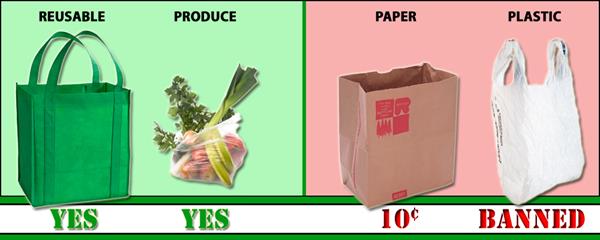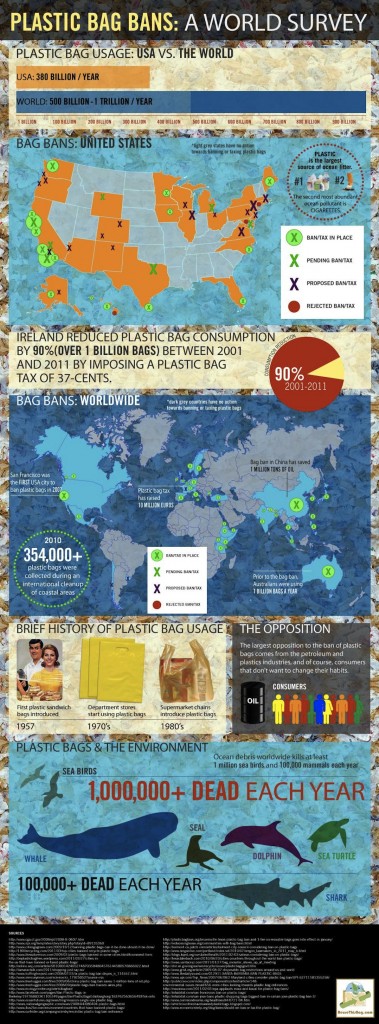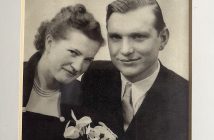A Thing of the Past: Second Phase of Plastic Bag Ordinance goes into Effect Today
From now on, Santa Barbara shoppers should remember to always bring their own bags. Today, the second stage of the city-wide plastic bag ordinance is going into effect for small stores under 10,000 square feet. Stores of this size usually include gas stations, liqueur stores, and small grocers. Shoppers are not able to receive plastic bags at checkout anymore, but there are alternatives: Recyclable paper bags are available for a ten cent charge, but shoppers are encouraged to bring their own reusable bags. On May 14 of this year, shoppers in Santa Barbara witnessed the first phase of the ordinance; stores over 10,000 square feet complied with the law, taking the first step toward making the single-use plastic bag a thing of the past. Seth Nickinson, Public Outreach Coordinator of the Santa Barbara City Trash and Recycling Team, estimates that after the implementation of phase two of the ordinance the city will be saving 44 million plastic bags yearly!
Santa Barbara divided the plastic bag ordinance into two phases to be able to see how well it would be received, both by the stores and by the consumers. In an interview with Seth Nickinson, he informed me that there are no definite numbers yet, however, “people get it,” whether they bring their own bags or buy paper bags at checkout. During my own investigation of consumers’ reactions to the ordinance, a gentleman raises a good question: why do stores charge for paper bags and keep the money? Why aren’t the ten cents being given to an environmental cause? Seth Nickinson explains that the ordinance is a regulation, not a tax. Since the stores have to buy those paper bags in the first place, they are allowed to keep the change for themselves. The stores are encouraged to put the difference toward educating people about the bag ordinance. Additionally, he stresses that, before the ordinance, single-use plastic bags were also being sold to consumers, they were not free either. The costs for plastic bags were calculated into everything the stores would sell. The difference is that now with paper bags it is more transparent.
Santa Barbara is not the first city to ban plastic bags in California. Over 120 local governments have already banned single-use plastic bags. On September 30th, 2014, Governor Jerry Brown took charge: He signed a state-wide bill, called SB 270, which would prohibit California stores to distribute single-use plastic bags. However, there is a twist: Kathi King, development activities manager at the Community Environmental Council (CEC), explains that the opposition, the plastic industry, may file for referendum, which would entail 500,000 collected signatures by the end of December 2014. If the opposition succeeded at getting those signatures, the law would not go into effect as planned, but instead the state-wide plastic bag ordinance would go on the ballot in Fall 2016. Otherwise, California would be the first state in the nation to ban plastic bags altogether. Such a bag ordinance is not uncommon around the world: many European countries have taxed plastic bags, or have banned them altogether. China has banned plastic bags in 2008, and Bangladesh was the first country in the world to ban single-use plastic bags. Why is this such a pressing issue?
If we don’t start somewhere, nothing will ever change. Plastic bags, compared to other types of trash, have a fly-away tendency, which is why they are so dangerous for our environment and for our oceans. It is almost impossible to clean up our oceans of all the trash that has unfortunately ended up there, but we can stop using throw-away materials. Did you know that 60,000 plastic bags are being consumed in the United States every 5 seconds? Along with plastic bags, plastic bottles are equally harmful for the environment. 2 million plastic bottles are consumed in the U.S. every 5 seconds; 17 million barrels of oil are being consumed for plastic bottles each year, while 2.5 million tons of carbon dioxide are being released in this process. In 2008, 12 billion dollars were spent on water bottles in the U.S. More plastic has been produced from 2000 until 2010 than in the entire 20th century. Ireland has decreased their plastic bag use by 90% since the country implemented a ban on them in 2002.
Is this overwhelming? Are you alarmed by these numbers? Good. Disposable bags were made to be thrown away, but where is “away?” We need to realize that there is no “away.” Single-use plastic bags are made out of petroleum, which means that they are not recyclable. It turns out that those plastic bags stay with us for a really long time. Researchers do not know how long it takes for a single-use plastic bag to decompose. Research suggests that it can take from 100, to 500, to 1000 years, however, they are not even sure whether particles of the bags would fully deteriorate. So what can we do? Kathi King of the CEC explains that “disposable plastic’s impact far outweighs its usefulness.” She offers other options, such as avoiding packaging in the food aisles, being more resourceful and making more food on your own instead of buying them pre-made and pre-packaged, and always using reusable bags, even if plastic bags are available. We need to change our habits, whether we like it or not.
Resources:
Watch the documentary “Bag It: Is your Life too Plastic?”
More facts about plastic bags





